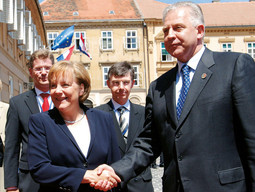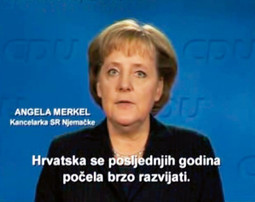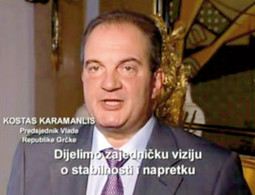Published in Nacional number 633, 2007-12-27
POLITICAL REPORT
The Bundestag against Angele Merkel for the HDZ campaign commercial
THE SOCIALIST MPs in the German Parliament will address the issue of Angela Merkel’s appearance in Ivo Sanader’s campaign commercial
 ANGELA MERKEL AND IVO SANADER have had friendly relations ever since she was known as ‘Kohl’s girl’ within the CDU “The Republic of Croatia has begun rapid development and has become the driver of South East Europe. Thanks to reforms in the economy, judiciary and public administration, Croatia is well on its way to becoming a member of the European Union. This has all taken place under the leadership of Ivo Sanader and HDZ.” These are the words of Angela Merkel, German Chancellor, who appeared in an HDZ campaign commercial. Because of this appearance, she could face serious problems within the “great coalition” between the Christian Democrats and the Social Democrats in January 2008. In the best case scenario, the role of the Chancellor of the German Government in the HDZ election commercial will be discussed in the parliament in Berlin.
ANGELA MERKEL AND IVO SANADER have had friendly relations ever since she was known as ‘Kohl’s girl’ within the CDU “The Republic of Croatia has begun rapid development and has become the driver of South East Europe. Thanks to reforms in the economy, judiciary and public administration, Croatia is well on its way to becoming a member of the European Union. This has all taken place under the leadership of Ivo Sanader and HDZ.” These are the words of Angela Merkel, German Chancellor, who appeared in an HDZ campaign commercial. Because of this appearance, she could face serious problems within the “great coalition” between the Christian Democrats and the Social Democrats in January 2008. In the best case scenario, the role of the Chancellor of the German Government in the HDZ election commercial will be discussed in the parliament in Berlin. Merkel’s participation in the commercial, alongside three other Conservative Prime Ministers: Jean-Claude Juncker from Luxemburg, Bertie Ahern from Ireland and Kostas Karamanlis from Greece, has aroused criticisms, as the SPD believe it unacceptable for the Federal Chancellor to promote a political party in Zagreb. Inasmuch, it is necessary to be objective, as this as an internal policy affair that will not affect the relations of Germany’s two leading parties, but will certainly leave its trace on the political scene there. This also marks a precedent, as no Chancellor of the Federal Republic of Germany has ever directly meddled in the electoral process in another country. In face, German politicians will rarely even comment on inter-party relations abroad.
The influence Angela Merkel has over Sanader is also seen in the fact that the coalition between HDZ and HSS-HSLS was based on the agreement between the CDU and SPD. Also, she was again the first to congratulate Sanader on his election win, and only later did other politicians such as Olli Rehn and Sali Berisha join in.
Just before the Christmas holidays, members of the SPD in the Bundestag wrapped up the drafting of an official document seriously reprimanding Angela Merkel for her open support to Ivo Sanader and the HDZ.
The document reads, “We would like to know, is it your opinion that democracy in Croatia is in such jeopardy that the president of the CDU must be involved in a campaign to benefit a particular party. Why is Mrs. Merkel signed as the Chancellor in the commercial? Do you hold this to be correct? Why in her support is Mrs. Merkel aggressive, while the remaining participants are much milder? Will Mrs. Merkel participate in a similar fashion on behalf of her party colleague Vojislav Kostunica in the upcoming elections in Serbia?” The document continues, stating that in the elections held on 25 November, the SDP successfully improved its election result, increasing the former number of mandates from 33 to 56. Considering that the HDZ won the same number of seats as in the previous elections, does Angela Merkel believe her participation in the campaign to be successful? Finally, the letter again repeats that Croatia is a democratic European country, which does not require the interventions of any politicians from abroad. The author of these questions was Johannes Jung, an SPD MP from Baden-Württemberg and a member of the Bundestag foreign policy board. Jung is very well informed in the situation in the region, not to mention that he is married to a woman from Zagreb and had an excellent grasp of the Croatian language. As a member of the foreign policy board, he has had the opportunity to meet all the leading Croatian politicians, and he closely followed the most recent elections. The SPD leadership is familiar with the questions he has prepared for Angela Merkel and which will need to be answered within one month’s time.
 QUESTIONABLE MOVE BY ANGELA MERKEL The Socialists are convinced that meddling in the Croatian elections was unnecessary
QUESTIONABLE MOVE BY ANGELA MERKEL The Socialists are convinced that meddling in the Croatian elections was unnecessary “This is truly an unbelievable situation that has never been seen before in Germany. There is no need for anyone to meddle in the elections of a democratic country such as Croatia, and particularly not in such a way that her name and the title German Federal Chancellor is portrayed. Furthermore, this opens the issue of her relationship with other members of the European People’s Party, such as Kostunica, who is president of the Serbian Democratic Party. Inasmuch, some form of involvement in the elections in Serbia could be justified, such as offering support to the democrats such as Boris Tadic, but Croatia is another story. This is a stable democratic country, and there is absolutely no reason for involvement in the elections,” considers Jung.
He refutes the theory that the CDU and CSU are more inclined towards Croatia than the Social Democrats and the left wing overall. He claims that this is incorrect, as Germany’s policy towards Croatia has been a unanimous one since 1990, and there is no great difference on that issue among the parties. “I am familiar with this legend by which the Christian Democrats support Croatia and the SPD criticizes it. But that is not true. I personally know 4 or 5 CDU MPs in the European Parliament who are against Croatia’s entry into the EU. Meanwhile, Martin Schulz, head of the Social Democratic faction in the European Parliament is a strong advocate of your country,” says Jung.
Ivo Sanader would certainly not share his opinion. For more than a decade, Angela Merkel has been among Sanader’s closest friends in international politics, and the two politicians share very similar ideological stances. Finally, when Gerhard Schroeder’s government fell in autumn 2005, Sanader’s associates were quick to anonymously claim to the domestic media that it would be Angela Merkel who would most lobby for the start of negotiations between Zagreb and Brussels. Things began to develop only partly according to HDZ’s desires. Croatia did in fact open the negotiations, but only after the arrest of Ante Gotovina and his transfer to the Hague. Meanwhile, during Germany’s presidency over the EU in early 2007, Croatia marked no significant progress in its rapprochement to the EU.
If there was support from Berlin, it was relatively discrete. The only situation in which explicit support from Merkel was seen was in June of this year, at her speech at the EU Summit. She said, “When we complete the negotiations in 2009, how will we be able to tell Croatia that she has done her job, but the EU had not.” Then she also warned Vaclav Klaus and Lech Kaczynski, saying that the Czech and Polish blocking of the new Reform Agreement of the European Union was blocking Croatia’s entry. It is understandable that such a stance only significantly deepened the relations between the Croatian Premier and the German Chancellor.
Ivo Sanader and Angela Merkel met in the mid 1990s, when this Eastern German politician became the most important conservative politicians in Helmut Kohl’s government. At that time, German-Croatian relations were on the downslide, as Berlin and Bonn did not support Tudjman’s policies over the division of Bosnia and Herzegovina. Even though Helmut Kohl, Hans-Dietrich Genscher and Alois Mock were strong lobbyists for the international recognition of Croatia in 1991, in the following two to three years, the situation changed, even though the party ties between the HDZ and the CDU-CSU coalition remained quite strong.
 THE GREEK PREMIER was most modest in his praise
THE GREEK PREMIER was most modest in his praise
True, the election results was extremely close, and so a “great coalition” between the CDU and the SPD was formed in Berlin, with 447 of the total 614 MPs in the Bundestag. In any case, the politician that Sanader had met as “Kohl’s girl” one decade earlier, became Chancellor of the Federal Republic of Germany in autumn 2005.
Angela Merkel and Ivo Sanader meet several times a year. This is usually at the meetings of the heads of the European People’s Party, though bilateral meetings are not rare. In June 2006, Sanader and Merkel together watched the match between Croatia and Brazil at the World Football Championships in Berlin. Earlier, in November 2003, Angela Merkel and then president of the CSU Edmund Stoiber, also participated in the HDZ election commercial, but at that time, their participation did not arouse any protests. The reason was simple, at that time Angela Merkel was acting exclusively as the president of the CDU – then an opposition party. Four years later, the actors and the situation are the same, but the circumstances are significantly different. Merkel runs the government in Berlin, and her presence in the HDZ commercial had awoken many ghosts in German politics. As such, at least during a session, Croatia will become an important topic in the Bundestag in mid January.
Latest news
-
28.10.2010. / 14:15
'A profitable INA is in everyone's interest'
-
28.10.2010. / 09:38
Sanader’s eight fear SDP — Won’t bring down Government
-
21.10.2010. / 15:02
Interior Ministry turned a blind eye on Pukanic assassination
-
20.10.2010. / 09:34
Barisic could bankrupt HDZ



